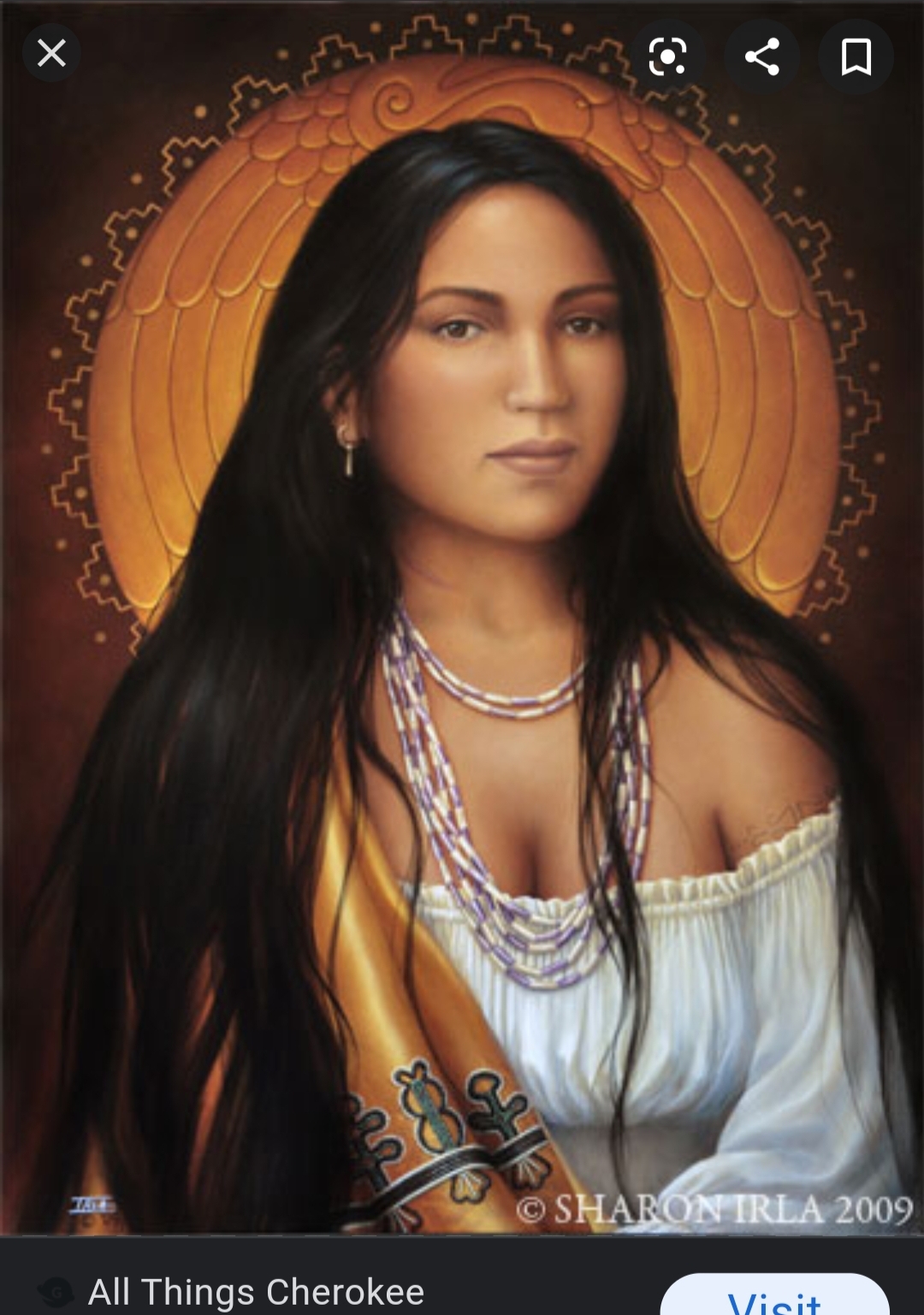
1126: Nancy Ward
The Last Beloved Woman of the Cherokee Nation
Born: c.1738, Chota, Cherokee Nation (Present-day Monroe County, Tennessee, United States of America)
Died: 1822, near Present-day Benton, Tennessee, United States of America
Also Known As: Nanye-hi (Translated as either One who Goes About or She who Walks Among the Spirits—sources differ)
Nancy has been hailed as the Pocahontas of Tennessee and a princess and prophetess of the Cherokee Nation.
Nancy’s maternal uncle was an important chief for his people (the Wolf Clan), and he personally believed finding a way to co-exist with the British colonizers gave his people the best chance to survive. His believes would make a lasting impression on Nancy.
By the time she was seventeen or eighteen (again, sources differ), Nancy was married with two children. Nancy fought in battle against the Creek Nation with her husband, and reportedly chewed the ends of his lead bullets to make them pointier and deadlier so…that’s nice. After her husband was killed in the fighting, Nancy took his rifle and led her people to victory, expanding Cherokee territory into northwest Georgia.
Because of her victory, Nancy was given the title of Ghigau or Beloved Woman. This meant she was able to sit in on councils with the chiefs, led the Woman’s Council of Clan Representatives, was given a vote in the general council (the only woman with this power), and was given total control of prisoners taken in raids or battles. The Cherokee also believed the Great Spirit spoke through the Beloved Woman and so she was also spiritually powerful. In a word, Nancy was a badass.
In the latter part of the 1750’s, Nancy married an English trader and took an Anglicized name to reflect her new status as the wife of an Englishman. Together, Nancy and her new husband had one daughter. After a few years, Nancy’s husband went home to his already existing English wife and family in South Carolina and evidently Nancy and her daughter would go visit them on occasion. The Cherokee did not see marriage as a lifelong institution and so this little detail wasn’t a hang up for Nancy of her people.
In 1776, after the outbreak of the American Revolution, Nancy decided she wanted to try and keep the peace with her new American neighbors even though part of the Cherokee Nation, including her cousin, wanted to drive the white settlers out. After learning of a planned raid on the white settlement, Nancy released three of her prisoners (who were white) and told them to warn their people. With sufficient time thanks to Nancy, the settlers were able to evacuate most of the women and children to safety before the Cherokee attack.
During the raid, the Cherokee managed to capture one white woman and bring her back to the Cherokee village. The warriors wanted to burn the woman alive, but Nancy managed to save her and eventually set the woman free to return to her people. This woman, along with the other prisoners Nancy had released earlier, began to spread the word of the Beloved Woman who wanted to keep the peace between her people and the settlers.
The following year, white settlers retaliated for the Cherokee attack by invading the Cherokee nation. All the Cherokee settlements were attacked, save the village where Nancy lived out of respect to her. Throughout the rest of the American Revolution battles between the Cherokee and the Americans continued. In 1781, Nancy spoke with the white leaders who were trying to negotiate a peace treaty between their people, and while these white leaders were confused by a woman having such a public role, especially a political one, Nancy made an impression. Her family was protected throughout the rest of the war.
In November 1785, Nancy and the new Cherokee chief signed a peace treaty with the newly formed United States of America. Soon after, Nancy’s daughter (that she shared with her white husband) married the Virginia Indian Commissioner.
In the years following, white settlers continually encroached on Cherokee land because the ground was perfect for growing cotton. Washington’s administration was aware of the problem but failed to act in any meaningful way to stop it. By the early 1820’s, the Cherokee had sold much of what remained of their land in order to at least turn some form of profit instead of losing everything. Nancy entered a written plea to try and stop the sales in 1819, realizing that after decades of advocating a peaceful co-existence it had all come crashing down. Nancy became an innkeeper after her homeland was sold off, and she was cared for her by her son in her final years.
Nancy is credited with introducing cattle ranching, dairy farming, spinning cloth, and slaveholding to the Cherokee society. She was instrumental in transitioning the Cherokee away from their traditional way of life and towards a more Western society, and so her legacy within the Cherokee culture and history is complicated to say the least.
The National Society Daughters of the American Revolution named a chapter in her honor, as well as building two monuments to her at her gravesite. The first was erected in 1923 and the second in 2018. Both can be viewed on her Find a Grave profile, which is linked below.
Badges Earned:
Find a Grave Marked
Located In My Personal Library:
Revolutionary Mothers by Carol Berkin
Revolutionary Women by Peter Pauper Press
Who Knew? Women in History by Sarah Herman
Women in American Indian Society by Rayna Green
Sources:
https://tennesseeencyclopedia.net/entries/nancy-ward/
